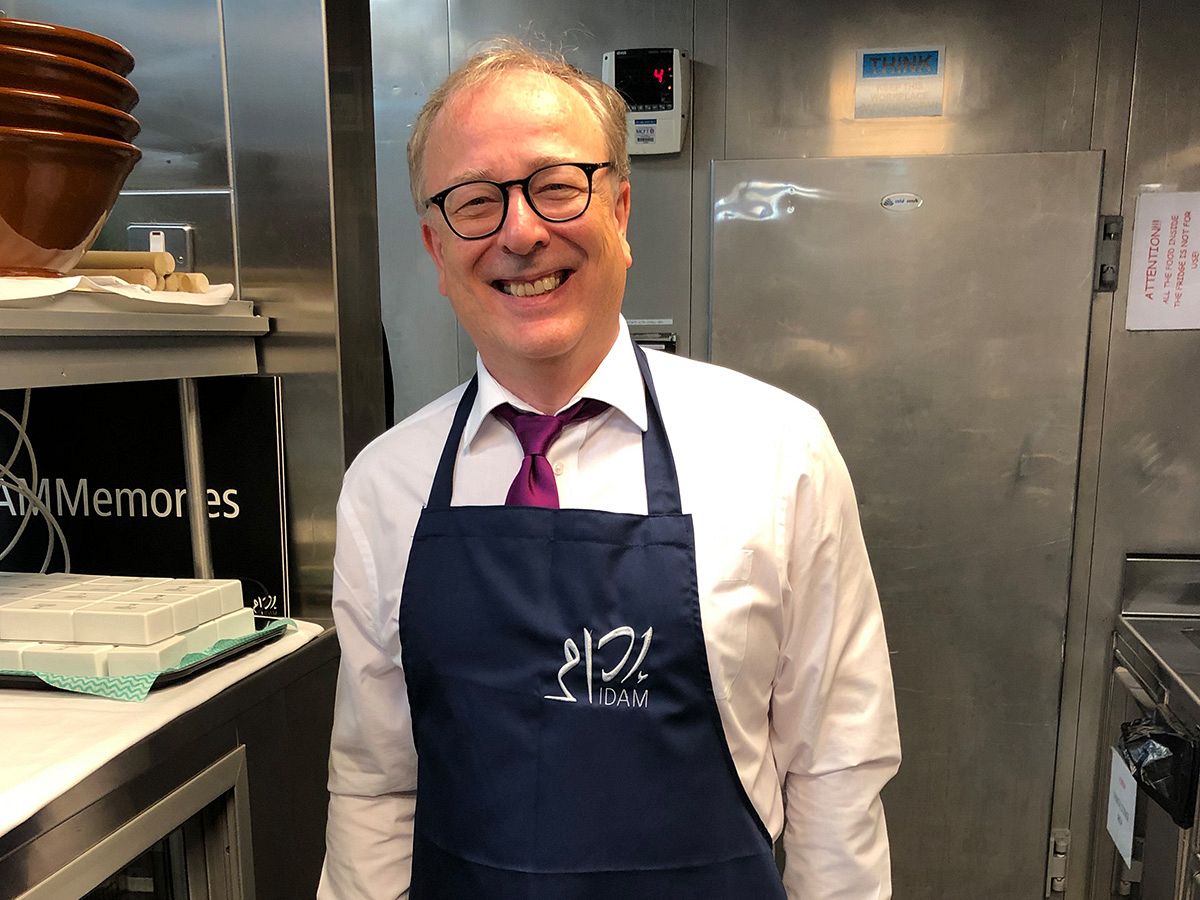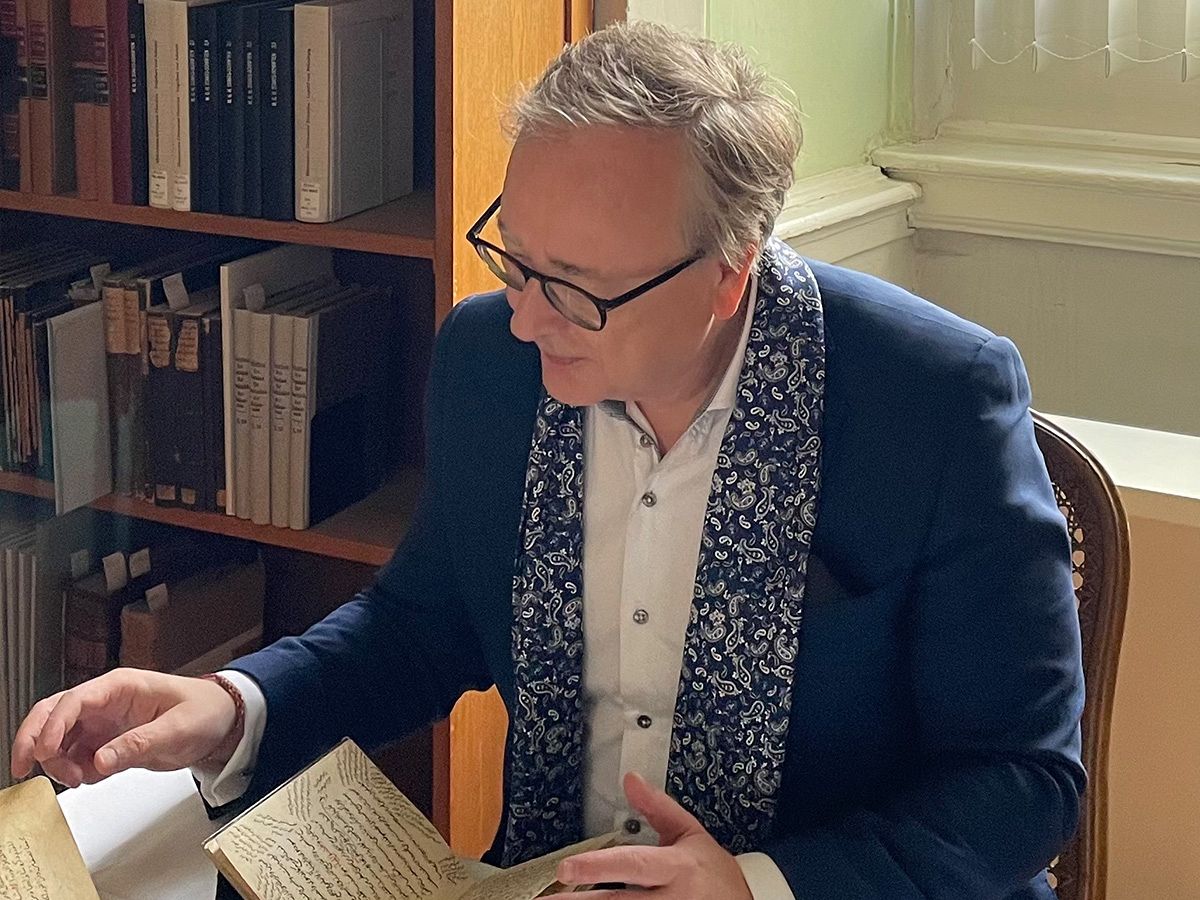Professor Daniel Newman is a professor in our Department of Modern Languages and Cultures.
Dialogue spoke to Daniel to find out more about his research and his passion for medieval Arab food.

Professor Daniel Newman
Tell us about yourself and your research.
I hold the Chair of Arabic Studies at the School of Modern Languages and Cultures – I can scarcely believe that it’s been nearly twenty years since I first arrived in Durham!
I got my PhD from the School of Oriental and African Studies and over the course of my career, I’ve taught in several countries, in Europe, the USA and the Arabic-speaking world.
I am a cultural historian of the Middle East and North Africa, and my research has covered several areas, including the ‘long’ nineteenth century in the Muslim world and Arabic travel literature, but it was my work on medieval Islamic medicine that led me to food history many years ago. It’s important to know that this is an obvious connection since within the medical framework of the time, food played a key role and was thought to both cause and cure illness.
It’s an extremely exciting field to work in, not least because there is no shortage of material. In the culinary literature alone, there are well over 4,000 recipes, covering a period of some six centuries (ninth - fifteenth) and a geographical area from Spain to Iraq. And to that number we can add a fair few that are found in medical, dietetic, and pharmacological sources. In total, we’re looking at between 4,500 and 5,000 recipes.
My first work in the field dealt with medieval Muslim aphrodisiacs (the Sultan’s Sex Potions). This was followed by the edition and translation of a 15th century Egyptian cookery book (The Sultan’s Feast) and then, most recently, a 13th century collection of recipes from Muslim Spain (known in Arabic as al-Andalus) and North Africa (The Exile’s Cookbook).
I’m particularly proud that some years ago I was able to identify a previously unknown medieval Arabic culinary treatise - unfortunately anonymous - in a manuscript held at the Wellcome Library in London, which brought the total of known remaining recipe collections to ten.
It is a very significant text since, though it was copied in the Western Mediterranean, its contents have a lot in common with the earliest documented Arab culinary tradition of the Abbasid caliphate (ninth century), and its capital Baghdad. As a result, it will not only contribute to our understanding of this period, but also shed more light on the links between the pharmacological and culinary literatures, as well as on the mobility of culinary texts across the Muslim empire.
I’m currently preparing an edition, study and translation of this important resource.

What is The Exile’s Cookbook about?
The book is one of only two culinary texts that were produced in the Western region of the Muslim Empire, in the thirteenth century. It is, however, unique because it also includes dishes originating from North Africa.
I had already started translating the text from an existing edition, when six years ago, I was fortunate to find a new manuscript copy at the British Library which had eluded detection since it was untitled and anonymous. This was particularly important since the edition relied on two incomplete manuscripts, and suddenly, I had access to the complete text! I still have to pinch myself that I identified not only an entirely new recipe collection, but also an unknown copy of another one. For a researcher, life doesn’t get much better than that!
It is also a wonderful example of a medieval Arabic cookery book in that it runs the full gamut of the dining experience as it includes recipes for breads, noodles, various types of savoury dishes – stews, roasts, porridges, couscous, sweets, condiments and preserves, but also for fragrant hand-washing powders. Like nearly all the other cookery books, it is the cuisine of the elite that is presented here, though there are a number of references to humble dishes that would have been enjoyed by commoners.
It was written by a refugee from Muslim Spain whose hometown Murcia had fallen to the Christians and eventually ended up in Tunis by way of Morocco and Algeria. The book reveals the journey of its author and the existence of a distinct regional cuisine of the Western Muslim Mediterranean at that time. The text includes quite a few recipes and ingredients not found anywhere else, such as tuna and snails!
How did you develop your passion for recreating medieval Arab food?
It grew out of my research, initially just as a fun pastime – I don’t think there is a single food historian who has not, at some point, asked themselves ‘what would these dishes have actually tasted like?’ I never realised that over a decade later, I would have recreated hundreds of recipes! Besides being very enjoyable – my wife also joined in with a vengeance – the exercise proved to be very useful to my research since it often clarified recipes, which can be very thin on crucial details like measures! As a result, it is often a question of trial and error, though now I can say that I have developed quite the medieval palate and my ‘guesstimation’ of quantities of ingredients has gotten better and better!
What is even more surprising is the fact that there’ve been very few disasters, and most of the dishes really taste very nice. In fact, some of them have become part of the household repertoire! What was far more unexpected – to me at least – was the amount of attention my work got on social media once I started reporting on it, first in a blog (http://wwww.eatlikeasultan.com) and then Instagram (@medieval_arab_cooking). I post several times a week on recreations as well as on all aspects of medieval Arab cooking practice.
Tell us about your recent trip to Bahrain...
In September, I curated four Medieval banqueting events in Manama, the capital of Bahrain, in collaboration with the amazing chef Tala Bashmi, winner of the best female chef of the MENA (Middle East and North Africa Region) in 2022, and executive chef at Fusions by Tala, which was recently voted one of the best 50 MENA restaurants. The dining experience was the result of a long process during which the chef gave her own unique twist on medieval recipes informed by my research and culled from across all the sources.
The chef could give full rein to her creativity but was also working within certain unusual constraints; the main one being that we had a rule that we could use only ingredients that were around in the medieval culinary tradition. This is far more challenging than one can imagine since it meant, for instance, that ingredients we take for granted today, such as tomatoes, chillies, potatoes, to name but a few, were only imported from their homelands in the Americas after the 15th century. Nonetheless, the magic happened, and the result was a six-course symphony of flavours using locally sourced ingredients which gave those who attended a unique taste of the development of the Arab culinary heritage.
Why do you think food history is so popular?
I think it’s a subject that has been getting more and more attention over recent years, not least with the explosion of social media, where suddenly everyone seems to be cooking up a storm. The other important, and perhaps new, element is the interest in non-European and non-traditional cuisines. It has led to the emergence of a large community of like-minded enthusiasts from all walks of life, who are all driven by their desire to share their passion.
What other exciting plans do you have in the pipeline?
Oh, there are plenty of those! I am working on another project that will involve bringing the medieval kitchen to life by recreating equipment and tools.
In early 2024, I’ll be taking part in the exhibition Dining with the Sultan: The Fine Art of Feasting, at the Los Angeles County Museum of Art (LACMA). Besides acting as a consultant to the event, I also contributed to the catalogue.
Over the longer term, I’ll be collaborating with chefs on several exciting projects, but I can’t really say too much about that at this stage, so watch this space!
Away from work, what’s your idea of a perfect day off?
That would be spending time with my family and perhaps playing some percussion, which is another love of mine, but one that I have not had much time for in recent years because my work keeps me so busy.
Join our team of food history experts, Daniel L Newman, Giles Gasper and Amanda Herbert as they recreate a delicious medieval sweet, Zulabiyya, and share insights from their own research on cooking historical recipes. Find out more: Edible History - Durham University
